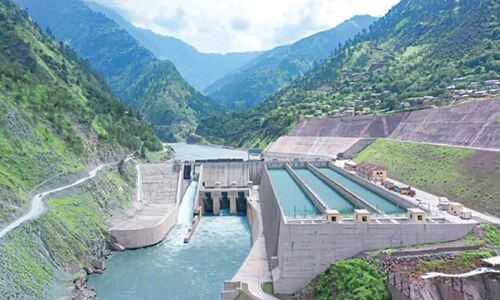
Pakistan needs to improve its tax collection as it faces a sizeable public debt of 66 per cent of GDP (as of March 2022) worth Rs44 trillion or Rs200,000 per Pakistani citizen. The federal government lacks the resources to even meet its “must have” expenditures post the transfer of the provincial share. The 18th Amendment has resulted in a financially weaker federal government with provinces lacking the institutional capacity to deliver the devolved subjects.
A typical businessperson in Pakistan relies on cash dealings and rollover of “cash” cheques to avoid business transaction documentation. The ill-gotten black money is typically parked in real estate, foreign exchange, bearer securities and gold.
The results of the historical tax documentation and amnesty schemes remain dismal with only about two million taxpayers in a country of 220m (roughly 1pc of the population) and an abysmally low tax-to-GDP ratio of about 9pc (vs approximately 19pc for India).
The culture of tax evasion is so ingrained that it is impossible to comprehensively document the black economy via Federal Board of Revenue notices (that often result in harassment and corruption) and tax amnesty schemes.
To improve tax collection, a multi-pronged long-term strategy with meticulous planning and discipline is required
The following measures attempt to create an ecosystem to timely document the black economy in the country:
Real estate documentation in major urban cities
This is a major exercise but has been successfully done in countries like Australia where PEXA (Property Exchange Australia) maintains a digital national land registry record. This will also help resolve the plethora of property/inheritance litigations, attract significant dollar-denominated real estate investments from overseas Pakistanis and discourage the parking of ill-gotten capital in the unproductive ”land investments” that do not generate any economic activity.
Regulate local gold trade
Set up dedicated buildings for goldsmith trade and supervise such establishments for tax compliance.
Control foreign currency cash
Declare holding of “physical” foreign currency as a criminal offence. Pakistanis can freely hold foreign currency but only in foreign currency bank accounts.
Facilitate opening foreign exchange bank accounts using the National Database & Registration Authority (Nadra) database (as done with Roshan Digital Accounts) and for international travellers at all entry points in the country (airports and dry ports).
Any foreign currency brought into the country has to be surrendered and deposited in bank accounts opened upon arrival at the airports and withdraw the permission to carry up to $10,000 cash per passenger (major avenue of Hundi and Hawala). Any overseas payments need to be conducted via foreign currency bank accounts.
Every Re1 depreciation increases the public debt by approximately Rs90bn
Ban “cash” cheques
Businesspersons use “cash” cheques as de facto legal tender whereby these “cash” cheques are rolled over from one party to another until their due date for encashment. This results in only one business transaction being registered in the banking system (vs multiple transactions settled using a single cheque) and supports the black economy functioning.
Bearer securities
Redeem and cease the issuance of bearer securities over time such as prize bonds. Databases like the Central Depositary Company could be engaged to have a centralised ownership database for prize bonds.
Promote digital banking
Promote internet banking and card-based payment system in the country. Use the Raast payment system and Nadra database to ease bank account opening as done for the RDA initiative.
Ban higher denominated banknotes

Once the aforementioned system has been sufficiently set up then the government should ban Rs5,000 and Rs1,000 banknotes as legal tender accompanied by a one-off tax amnesty scheme to deposit these soon-to-be-defunct high-denomination banknotes in the bank accounts.
This exercise would be different to the 2016 Indian banknote demonetisation which was not accompanied by a tax amnesty scheme where the maximum amount of cash deposit permitted without alerting the income tax authorities was $3,600 and therefore disrupted the Indian economy.
The above will provide an ecosystem whereby the business transactions will be automatically recorded while major leakage channels for ill-gotten capital (real estate, gold, foreign currency, bearer securities) are fully documented.
This is a multi-prong long-term strategy which requires meticulous planning and discipline to implement. Once the transactions are recorded then every citizen will have to pay their fair share in taxation. Furthermore, documenting the economy will also automatically help control corruption and avoid unnecessary litigations that plague our legal system.
It is to be noted that about 35pc of Pakistan’s gross public debt is dollar-denominated which represents a systematic macro risk for a country like Pakistan suffering from a structural current account deficit. Pakistan’s foreign public debt interest and principal servicing requirements are $20 billion per annum which is almost equivalent to the mammoth current account deficit of $21bn in FY22 causing rupee depreciation pressure. Every 1 rupee depreciation increases the public debt by approximately Rs90bn.
Pakistan has a junk sovereign rating of B3(negative)/ B-(negative) by Moody’s and S&P with a public debt-to-GDP ratio of 66pc as of March 2022. On the other hand, India has a solid investment-grade sovereign rating of Baa3 (stable) / BBB- (stable) by Moody’s/ S&P despite a much higher public debt-to-GDP ratio than Pakistan at approximately 90pc.
India’s better sovereign rating, amongst other factors, is due to India’s public debt profile being predominantly denominated in the local currency (mitigates sovereign default risk as local currency can be printed by the government to avoid default whereas dollar can only be printed by the US Government via the Federal Reserve).
To summarise, Pakistan needs to improve its tax collection and change the currency profile of public debt to local currency.
The author works as Director at an investment bank in London.
Published in Dawn, The Business and Finance Weekly, August 22nd, 2022













































